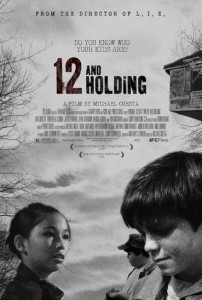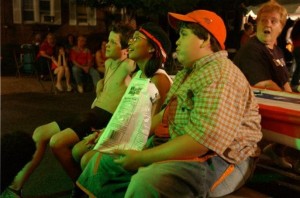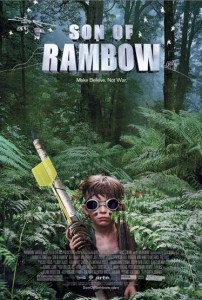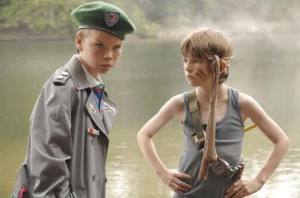By Mark
Special to The Dagger
The Queue is a monthly feature designed to showcase critically-acclaimed films that had limited commercial release and/or success. Each feature highlights films that focus on a specific theme, genre, or technique designed to provide a greater understanding of film as an entertainment and art form.
If there is one common thread that all of us share, it is our collective adolescence and the challenges that mold us into the adults we become. In this sense, films about growing up strike a poignant chord in all of us. A successful “coming of age” film will push the boundaries of our immediate experience while maintaining a common familiarity.
The two films selected approach this genre in distinctive ways, yet both tie together in the bittersweet combination of earnest loss and discomfited comedy. The success of both comes from capturing a complex narrative in the simplest terms, as one would understand them in childhood.
TWELVE AND HOLDING (2005)
Director: Michael Cuesta
Trailer: http://www.youtube.com/watch?v=5Agbf5VzXH0
To date, Michael Cuesta has only directed two films; this one and “L.I.E.,” another stunning picture that is criminally unknown. What stands out in both of his films is a masterful touch at incorporating difficult subject matter into a young cast and bringing out the best they have to offer.
Identical twins Rudy and Jacob (both played by Conor Donovan) and their close friends Malee (Joe Weizenbaum), and Leonard (Jesse Camacho) find themselves in a scrum with two local bullies (Michael Fuchs and Martin Campetta) during the summer. Conspired events lead to the confrontation that ends with the accidental death of Rudy at the hands of the bullies. His parents (Linus Roache and Jayne Atkinson) are devastated and infuriated by the slap on the wrist that the boys receive. Meanwhile, Jacob finds himself wishing he was the twin that died, while Malee explores her budding womanhood, Leonard revolts against his overweight family, and the two bullies attempt to cope with the tragedy they caused.
The emphasis that is placed on all the characters, not just the main three, is what elevates this film from others in the genre. While other films would play off the villains as one-dimensional stereotypes, they are handled with a realism that makes it hard to differentiate who is the victim. At the same time, the other characters’ three storylines are seamlessly integrated into a compelling narrative that is unrelenting in its pace and subject matter.
The young stars effortlessly portray their characters. Tackling difficult subject matter at several points in the film, the children pull it off with an ease that is less like acting than living out their roles. Consistent with the overarching theme of the movie, the characters behave bizarrely for an adult world, but quite realistically for youth still on its cusp. Jacob finds himself befriending one of the bullies after visiting him in jail, determined to answer questions about his brother’s death which he doesn’t even know how to ask. Malee chases a significantly older man in an effort to understand her mother’s failing love life through the lens of a child. Somewhere in the audience’s subconscious we are brought back to that place where we made a strange decision because we didn’t have the tools to cope with adult life.
It is said that art imitates life, but rarely is it so effectively captured. To be able to maintain this dichotomy while providing an engaging narrative is impressive. To be fair, there are moments that will pull you out of the created reality and remind you that this is film, not life. Still, in a genre that relies heavily on connecting with the audience at a primordial level of collective youth, this element of reality and the strength of the acting cements the story in our hearts and minds.
Acting 4.0
Character 3.0
Structure 3.0
Writing 3.5
OVERALL 3.5
SON OF RAMBOW (2007)
Director: Garth Jennings
Trailer: http://www.youtube.com/watch?v=em39YmVPTYs
Most of us can remember the first film we saw that changed the way we felt about cinema. For some of us it was a life-changing event that prompted us to write obscure movie reviews for a local news site. For everyone else, it opened a door to a world of imagination and wonder that didn’t involve writing five hundred words a month.
“Son of Rambow” is the name of the home movie made by two little boys with a big video camera and even bigger ambitions. Set on a long English summer in the early 80’s, “Son of Rambow” is a comedy about friendship, faith and the tough business of growing up. We see the story through the eyes of Will (Bill Milner), the eldest son of a fatherless Plymouth Brethren family. The Brethren regard themselves as God’s “chosen ones” and their strict moral code means that Will has never been allowed to mix with the other outside “worldlies,” listen to music or watch TV—at least until he finds himself caught up in the extraordinary world of Lee Carter (Will Poulter), the school terror and maker of bizarre home movies.
Carter exposes Will to a pirate copy of “Rambo: First Blood,” and Will’s mind is blown. He’s easily convinced to be the stuntman in Lee Carters’ diabolical home movie, and Will’s imaginative little brain is not only given chance to flourish in the world of filmmaking, but is also very handy when it comes to dreaming up elaborate schemes to keep his partnership with Lee Carter a secret from the Brethren community. Will and Carter’s complete disregard for consequences and innocent ambition means that the process of making their film is a glorious rollercoaster ride that eventually leads to true friendship. They start to make a name for themselves at school as movie-makers but when popularity descends on them in the form of the Pied Piper-esque French exchange student, Didier Revol (Jules Sitruk), their unique friendship and their precious film are pushed, quite literally, to breaking point. (Plot summary written by Hammer & Tongs.)
A deceptively simple film, “Son of Rambow” approaches the coming of age take from many different angles. On one level, the film is an easily enjoyable romp that celebrates making film—Garth Jennings loosely based the characters on his own experimentation with film as a child—as well as the simple joys of childhood friendship. But it also exists on a metaphorical level with the questions many of us face growing into adults. The truths of our parents and society, the loss of our innocence, and the meaning of friendship are all touched on subtly.
There is a lot for us as adults to learn (or perhaps remember) from the deceptively simple lesson of the film: stay true to yourself. Will, experiencing his metaphorical rumspringa, never strays far from his inner true self. This comes in contrast to the other characters, who find themselves trying to mold and adapt to the changing scene of life, ultimately and inevitably failing. For all the serious undertones, the film above all is a silly slapstick romp through childhood. Will approaches the film’s challenges with reckless abandon that is a joy to watch.
Eccentric animations and dream sequences provide a visual canvas that plays well into the feel of the film, even if the idea has become somewhat passé four years after the movie’s initial relase. The child actors again are fantastic in their roles and truly are enjoying every minute of making the film within the film, as well as the film itself.
From a simple idea, a great comedy is grown that is as poignant as it is hilarious. Be sure to watch towards the end for one of my favorite throw away lines, delivered with unrepentant innocence: “Is it broken? Can you fix it?”
Acting 3.0
Character 3.0
Structure 3.5
Writing 3.5
OVERALL 3.25







Leave a Reply
You must be logged in to post a comment.